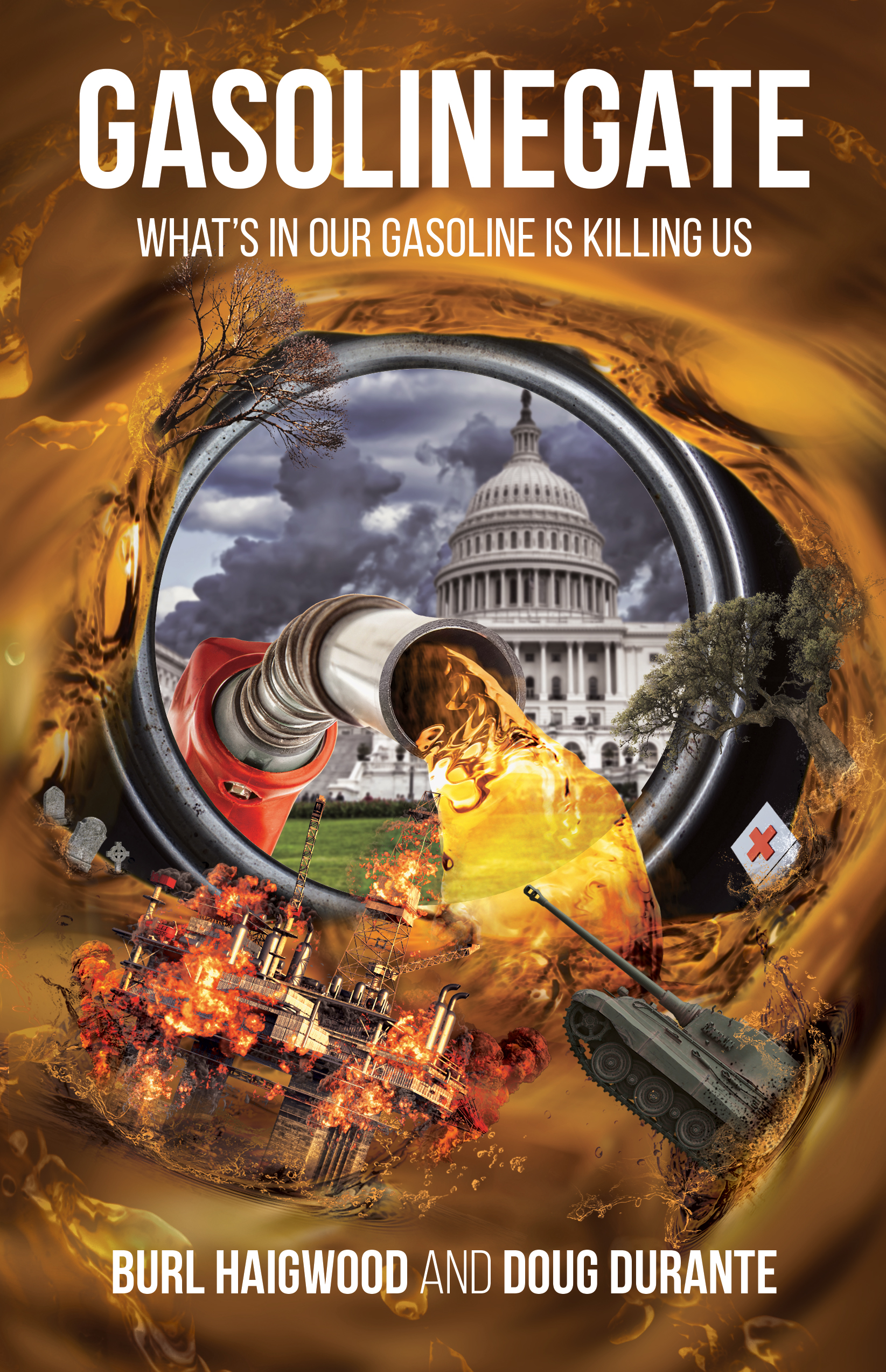New Book Exposes U.S. Failure to Clean up Gasoline & Develop Alternatives
"Gasolinegate: What's in Our Gasoline is Killing Us" is about the struggle to break the United States' dependence on petroleum, reliance on gasoline, and their consequential impacts on public health and the economy.

Washington, DC, May 30, 2023 --(PR.com)-- A new, tell-all book was released here today against the backdrop of the U.S. Capitol and the Nation's Memorial Day parade. "Gasolinegate: What's in Our Gasoline is Killing Us" is a first-of-its-kind expose about the 40-year struggle to break the United States' dependence on oil and gasoline and the negative impacts on public health and the economy.
Through dozens of interviews and firsthand accounts, authors Burl Haigwood and Doug Durante say that they document the U.S. Environmental Protection Agency’s (EPA) inaction and obstruction by the oil industry resulted in a stranglehold on the motor fuel market that endangers public health daily. The authors demonstrate how and why the public got duped into believing gasoline is safe and no viable alternatives exist.
"Gasolinegate," published by New Degree Press, is available at Amazon, Kobo, and public libraries. Burl Haigwood stated, "Just like Watergate, Tobaccogate, and Dieselgate, we now have Gasolinegate. We are kicking off our 'The Buck Stops Here' public education campaign by discounting the eBook from $9.99 to 99 cents on Amazon. This is part of our commitment to make 'Gasolinegate' accessible to as many people as possible."
Key points claimed by the authors in the book:
· Considering the total society costs of gasoline’s impacts on national security, healthcare costs, climate change, imports, and federal subsidies for fossil fuels, consumers are currently paying more than $15 per gallon for gasoline.
· The EPA has had authority and opportunities to establish standards for cleaner, safer domestic fuels - but failed.
· Emails obtained through the Freedom of Information Act show EPA and Oil interests collaborated to manipulate computer models used to certify fuel emissions and set standards.
· In 1948 the American Petroleum Institute stated the safe threshold for Benzene is zero. However, gasoline still contains about 20% Benzene and other benzene-based octane enhancers.
· $2-$3 trillion in federal and state subsidies combined with reluctance from consumers, oil companies, and automakers will likely force policymakers to delay current plans to ban internal combustion engines or achieve a 100% Electric Vehicle (EV) fleet.
Co-author Doug Durante said, "EVs can and should help in the future; consumers will need trillions of gallons of gasoline for decades. No logical justifications exist for the EPA to allow excessive levels of higher-carbon, proven carcinogenic benzene-based additives to remain in gasoline, i.e., #Gasolinegate."
Additional Information
Media Only: To receive a complimentary eBook, email gasolinegate@gmail.com.
www.gasolinegate.com: Extended Remarks Press Release, "Gasolinegate" Cover (high resolution), Quiz, and Video
Issue Updates: Twitter @ https://twitter.com/burl_haigwood, @burl_haigwood, follow #gasolinegate, Gasolinegate | Facebook
Through dozens of interviews and firsthand accounts, authors Burl Haigwood and Doug Durante say that they document the U.S. Environmental Protection Agency’s (EPA) inaction and obstruction by the oil industry resulted in a stranglehold on the motor fuel market that endangers public health daily. The authors demonstrate how and why the public got duped into believing gasoline is safe and no viable alternatives exist.
"Gasolinegate," published by New Degree Press, is available at Amazon, Kobo, and public libraries. Burl Haigwood stated, "Just like Watergate, Tobaccogate, and Dieselgate, we now have Gasolinegate. We are kicking off our 'The Buck Stops Here' public education campaign by discounting the eBook from $9.99 to 99 cents on Amazon. This is part of our commitment to make 'Gasolinegate' accessible to as many people as possible."
Key points claimed by the authors in the book:
· Considering the total society costs of gasoline’s impacts on national security, healthcare costs, climate change, imports, and federal subsidies for fossil fuels, consumers are currently paying more than $15 per gallon for gasoline.
· The EPA has had authority and opportunities to establish standards for cleaner, safer domestic fuels - but failed.
· Emails obtained through the Freedom of Information Act show EPA and Oil interests collaborated to manipulate computer models used to certify fuel emissions and set standards.
· In 1948 the American Petroleum Institute stated the safe threshold for Benzene is zero. However, gasoline still contains about 20% Benzene and other benzene-based octane enhancers.
· $2-$3 trillion in federal and state subsidies combined with reluctance from consumers, oil companies, and automakers will likely force policymakers to delay current plans to ban internal combustion engines or achieve a 100% Electric Vehicle (EV) fleet.
Co-author Doug Durante said, "EVs can and should help in the future; consumers will need trillions of gallons of gasoline for decades. No logical justifications exist for the EPA to allow excessive levels of higher-carbon, proven carcinogenic benzene-based additives to remain in gasoline, i.e., #Gasolinegate."
Additional Information
Media Only: To receive a complimentary eBook, email gasolinegate@gmail.com.
www.gasolinegate.com: Extended Remarks Press Release, "Gasolinegate" Cover (high resolution), Quiz, and Video
Issue Updates: Twitter @ https://twitter.com/burl_haigwood, @burl_haigwood, follow #gasolinegate, Gasolinegate | Facebook
Contact
Gasolinegate
Burl Haigwood
1-202-441-2400
www.gasolinegate.com
Burl Haigwood
1-202-441-2400
www.gasolinegate.com
Categories
